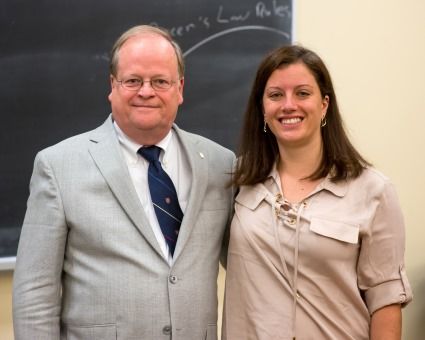

The career and legacy of retired Supreme Court Justice Thomas Cromwell, Law’76, LLD’10 (Mus’73) are the focus of a recently published volume of the Supreme Court Law Review, and its standalone collection, In Furtherance of Justice: The Judicial Life of Thomas A. Cromwell. “My hope is that this volume will be something people look to in the future for wide-ranging reflections on Justice Cromwell’s impact on Canadian law,” says co-editor Pam Hrick, Law’13.
Hrick, an associate with Stockwoods LLP, recalls how she immediately jumped at the opportunity to be involved in the creation of the collection. “My friend, colleague and fellow former Cromwell clerk, Stephen Aylward, had been approached about editing the volume. He wandered down the hall one day to ask if I would be interested in being co-editors (as volumes of this type often have). I agreed to do it without hesitation.”
Featured in the collection are a number of contributions from different members of the legal community, including academics, judges and practitioners. “We put out general calls for contributions to the faculty at Queen’s University and Dalhousie University (where Cromwell was a law professor earlier in his career), as well as to all of Justice Cromwell’s former clerks,” Hrick explains.
Three members of the Queen’s Law faculty, an alumnus teaching at Dalhousie, and Hrick herself answered the call. Queen’s Professors Nicholas Bala, Law’77, and Mary-Jo Maur, Law’85, LLM’93, co-authored an article on a less adversarial approach to family justice, and Professor Lisa Kerr co-wrote another on the law of public-interest standing. Dalhousie professor Leonard Rotman, Law’91, wrote a piece on fiduciary duties, while Hrick and two collaborators covered access to justice.
“We also invited a few individuals outside of these groups who we knew might have something to say about Justice Cromwell’s work and legacy,” Hrick continues. “We did all of this with an eye to ensuring that we had commentary on a wide range of areas of law.”
Indeed, the volume examines Cromwell’s contributions to legal developments in many areas of private and public law. Whether it’s digital privacy, contract, constitutional law or restitution, the collection’s authors can point to a landmark decision authored by Cromwell on each. “Ultimately, we produced a volume that touched on many areas to which Cromwell contributed,” says Hrick. This includes the ways in which Cromwell has promoted access to justice as both a judge and in his many non-judicial capacities.
The volume also introduces readers to Cromwell as “judge, professor and man.” As a former clerk, Hrick is able to personally recount this side of Cromwell. “He is well-known for his work ethic and devastating sense of humour, which he brought to all aspects of his job as a judge,” she says. “Clerking for Justice Cromwell was an exceptional and intellectually-challenging experience.”
What was the best part of editing such a collection? According to Hrick, it was the opportunity to work with leading academics, judges and practitioners who share her admiration for Cromwell. “I greatly enjoyed working with the various contributors who were all enthusiastic to be part of this project, many of whom have already made their own lasting contributions to shaping the Canadian legal landscape.”
By Michael Adams
Related Story:
‘Quintessential common law judge’ Cromwell celebrated at Queen’s symposium